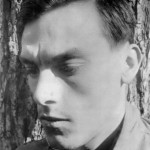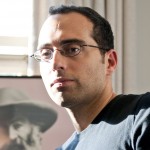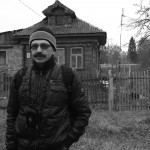Five poems by Arseny Tarkovsky with translations and an introduction by Philip Metres & Dimitri Psurtsev
Photos: Arseny Tarkovsky, Philip Metres, & Dimitri Psurtsev
Arseny Tarkovsky’s work emerges from a visionary sensibility—like Akhmatova and Mandelstam—that became his way of forging a Russian art outside of Soviet realism. Of course, it’s the music of the poems that guaranteed his reputation, as much as the vision. The following offers a range of his styles and approaches—from the free verse (a rarity in Russian poetry of the period) of Hail and The Hunt, to the more classical metrical and rhymed poems of the rest of the selection.
Dima and I considered various, sometimes radical, options. One option, briefly considered and then tossed, was the following: if, in American poetry, the “normative” mode is intonational free verse, then why not make all the “normative” Russian poems with rhyme and meter into that intonational free verse, and all the experimental (free verse or unrhymed poems) into poems with meter and rhyme? Another, more rigidly systematic one, would be simply to translate all the dactylic poems as dactylic poems, the iambics as iambic, and so on. This, frankly, seemed more possible but also literalist, since a poem in dactylic in Russian will mean something different than it will in American poetry. We decided against this rigid and misplaced conservatism, encouraged by the notion of the “semantic aura of meter.” Kirill Taranovski (and later Mikhail Gasparov) argue that each meter in Russian poetry carries with it the themes and associations of previous poets’ employment of those meters; the very idea that a poem’s meters are embedded in a larger discourse of form complicates any simplistic application of meter from poetic tradition to poetic tradition.
Our resolution of this interminable impasse between Russian metric and American poetry has been at once less systematic and more organic. Since Tarkovsky’s poetry is driven by its music, propelled by rhythm and rhyme, then our translation should make every reasonable attempt to make a similar music.
For a free verse poem like such as Hail on Petit-Bourgeois Street, we opted to remove all punctuation and create greater disjunction on the level of the line (even though normative punctuation exists in the original), in order to reproduce the astonishing effect of free verse to the Russian ear.
–Philip Metres
ГРАД НА ПЕРВОЙ МЕЩАНСКОЙ
by Arseny TarkovskyБьют часы на башне,
Подымается ветер,
Прохожие – в парадные,
Хлопают двери,
По тротуару бегут босоножки,
Дождь за ними гонится,
Бьется сердце,
Мешает платье,
И розы намокли.
Град
расшибается вдребезги
над самой липой…
Все же
Понемногу отворяются окна,
В серебряной чешуе мостовые,
Дети грызут ледяные орехи.
Hail on First Petit-Bourgeois Street
by Arseny Tarkovskytongues in the tower
pound the bells to sound
wind lifts everyone
rushes into entrances doors
slam along the sidewalk sandals
patter rain chasing behind
her heart pounds
her wet dress itches
& the roses are soaked
hail
shatters
above the very linden
still
little by little windows open—
cobblestones slick in silver scales
& children gobble up the nuts of ice
translated from Russian by Philip Metres & Dmitri PsurtsevОХОТА
by Arseny TarkovskyОхота кончается.
Меня затравили.
Борзая висит у меня на бедре.
Закинул я голову так, что рога уперлись в лопатки.
Трублю.
Подрезают мне сухожилья.
В ухо тычут ружейным стволом.
Падает на бок, цепляясь рогами за мокрые прутья.
Вижу я тусклое око с какой-то налипшей травинкой.
Черное, окостеневшее яблоко без отражений.
Ноги свяжут и шест проденут, вскинут на плечи…
The Hunt
by Arseny Tarkovsky
is done
I’m trapped
a hound hanging on my thigh
I throw my head back until my horns rest on my shoulders
and I trumpet
they slash my tendons
and jab a rifle in my ear…
He falls on his side, clinging to the wet twigs with his horns.
I can see his dim eye, a blade of grass stuck on it.
A black stiffened apple, reflecting nothing.
They’ll bind the legs together, pass a pole through, and toss it on their shoulders.
translated from by Philip Metres & Dmitri PsurtsevПОЭТ
by Arseny TarkovskyЖил на свете рыцарь
бедный…
Эту книгу мне когда-то
В коридоре Госиздата
Подарил один поэт;
Книга порвана, измята,
И в живых поэта нет.
Говорили, что в обличье
У поэта нечто птичье
И египетское есть;
Было нищее величье
И задерганная честь.
Как боялся он пространства
Коридоров! Постоянства
Кредиторов! Он, как дар,
В диком приступе жеманства
Принимал свой гонорар.
Так елозит по экрану
С реверансами, как спьяну,
Старый клоун в котелке
И, как трезвый, прячет рану
Под жилеткой из пике.
Оперенный рифмой парной,
Кончен подвиг календарный, -
Добрый путь тебе, прощай!
Здравствуй, праздник гонорарный,
Черный белый каравай!
Гнутым словом забавлялся,
Птичьим клювом улыбался,
Встречных с лету брал в зажим,
Одиночества боялся
И стихи читал чужим.
Так и надо жить поэту.
Я и сам сную по свету,
Одиночества боюсь,
В сотый раз за книгу эту
В одиночестве берусь.
Там в стихах пейзажей мало,
Только бестолочь вокзала
И театра кутерьма,
Только люди как попало,
Рынок, очередь, тюрьма.
Жизнь, должно быть, наболтала,
Наплела судьба сама.
The Poet
[Osip Mandelstam]
by Arseny TarkovskyOnce upon a time,
There lived a poor knight….
–Alexander Pushkin
A life ago, in a dark room
Of the State House of Publishing,
A poet gave me this volume.
The spine’s now cracked and broken,
Its author no longer living.
They said that he resembled
A kind of ancient bird
That flew above the Nile—
They saw his beggared
Greatness, his taut honor.
How he feared the expanse
Of corridors, the constancy
Of creditors. He, like a gift,
Accepted his award
In a fit of affected glee.
Just like the old clown
Who crawls across the movie screen
In cap and bows, as if stoned,
And, as if sober, hides the wound
Beneath his vest and overcoat.
Feathered by couplets, his feat
Over the calendar is complete.
Farewell—may all your roads
Be smooth. Greetings, paid
Holiday, black and white loaf.
He played with curved words,
Smiled with the beak of a bird,
Locked arms with anyone,
Feared being alone,
Read poems to strangers.
That’s how a poet should be.
I roam the globe,
Afraid of being alone.
For the hundredth time, lonely,
I read his book again.
So few landscapes in his poems—
Only the confusion of train stations,
The commotion of a theater,
Only people seen at random,
The marketplace, a queue, prison.
Life chatted through him, with him,
And his own fate would mutter.translated from Russian by Philip Metres & Dmitri Psurtsev
ОЛИВЫ
Марине Т.
by Arseny TarkovskyДорога ведет под обрыв,
Где стала трава на колени
И призраки диких олив,
На камни рога положив,
Застыли, как стадо оленей.
Мне странно, что я еще жив
Средь стольких могил и видений.
Я сторож вечерних часов
И серой листвы надо мною.
Осеннее небо мой кров.
Не помню я собственных снов
И слез твоих поздних не стою.
Давно у меня за спиною
Задвинут железный засов.
А где-то судьба моя прячет
Ключи у степного костра,
И спутник ее до утра
В багровой рубахе маячит.
Ключи она прячет и плачет
О том, что ей песня сестра
И в путь собираться пора.
Седые оливы, рога мне
Кладите на плечи теперь,
Кладите рога, как на камни:
Святой колыбелью была мне
Земля похорон и потерь.
Olives
for Marina Tarkovsky
by Arseny TarkovskyThe road leads down a steep cliff
Where grass falls to its knees
And ghosts of wild olive,
Laying their horns on stones,
Are frozen like a herd of deer.
I’m surprised I’m still alive
Amid so many graves and apparitions.
I guard the evening hours
And the gray foliage above me.
The autumn sky is my shelter.
I don’t remember my own dreams,
I’m unworthy of your late tears.
A long time has passed since the iron bar
Was pushed in behind my back.
And somewhere my fate hides
The keys near a fire in the steppe,
Her flickering companion looming
In a red shirt until morning.
She hides the keys and laments
That song is her sibling
And that she has to say goodbye.
Gray olive trees, place your horns
On my shoulders now. Place
Your horns on me as on the stones:
For this is my sacred cradle—
This land of loss and funerals.
translated from Russian by Philip Metres & Dmitri PsurtsevЯвь и речь
by Arseny TarkovskyКак зрение – сетчатке, голос – горлу,
Число - рассудку, ранний трепет - сердцу,
Я клятву дал вернуть мое искусство
Его животворящему началу.
Я гнул его, как лук, я тетивой
Душил его - и клятвой пренебрег.
Не я словарь по слову составлял,
А он меня творил из красной глины;
Не я пять чувств, как пятерню Фома,
Вложил в зияющую рану мира.
А рана мира облегла меня;
И жизнь жива помимо нашей воли.
Зачем учил я посох прямизне,
Лук - кривизне и птицу - птичьей роще?
Две кисти рук, вы на одной струне,
О явь и речь, зрачки расширьте мне,
И причастите вашей царской мощи,
И дайте мне остаться в стороне
Свидетелем свободного полета,
Воздвигнутого чудом корабля.
О два крыла, две лопасти оплота,
Надежного как воздух и земля!
Reality and Speech
by Arseny TarkovskyAs sight is to retina, voice is to throat,
Number to reason, early thrill to the heart,
I gave an oath to return
The life-giving source to my art.
Bending art like a bow, strangling
The bowstring, I ignored my vow.
I did not compile the lexicon word by word.
No, it created me out of red clay; not I
Who placed the five senses, like the fingers
Of Thomas, into the gaping wound of the world.
No, the wound of the world enfolded me;
And life is itself, despite our desires.
Why did I teach straightness to the staff?
Curvature to the bow, the grove to the bird?
Two palms, you’re on a single string,
O reality and speech, widen my pupils,
Give me the communion of your kingly power.
Let me stand aside
And witness the free flight
Of a ship erected by miracle.
O two wings, two fleshy blades
Reliable as air and earth.
translated from Russian by Philip Metres & Dmitri Psurtsev

